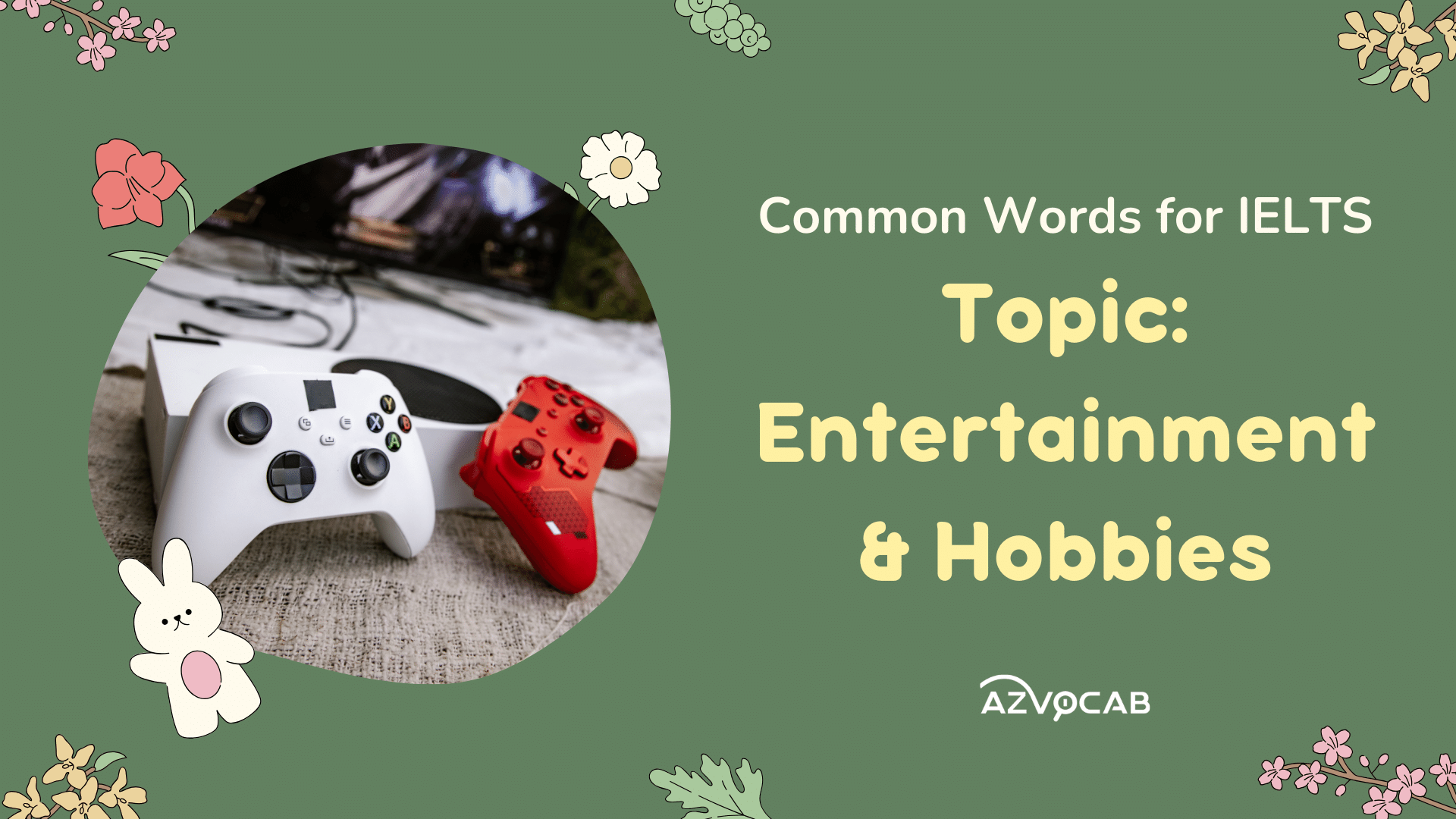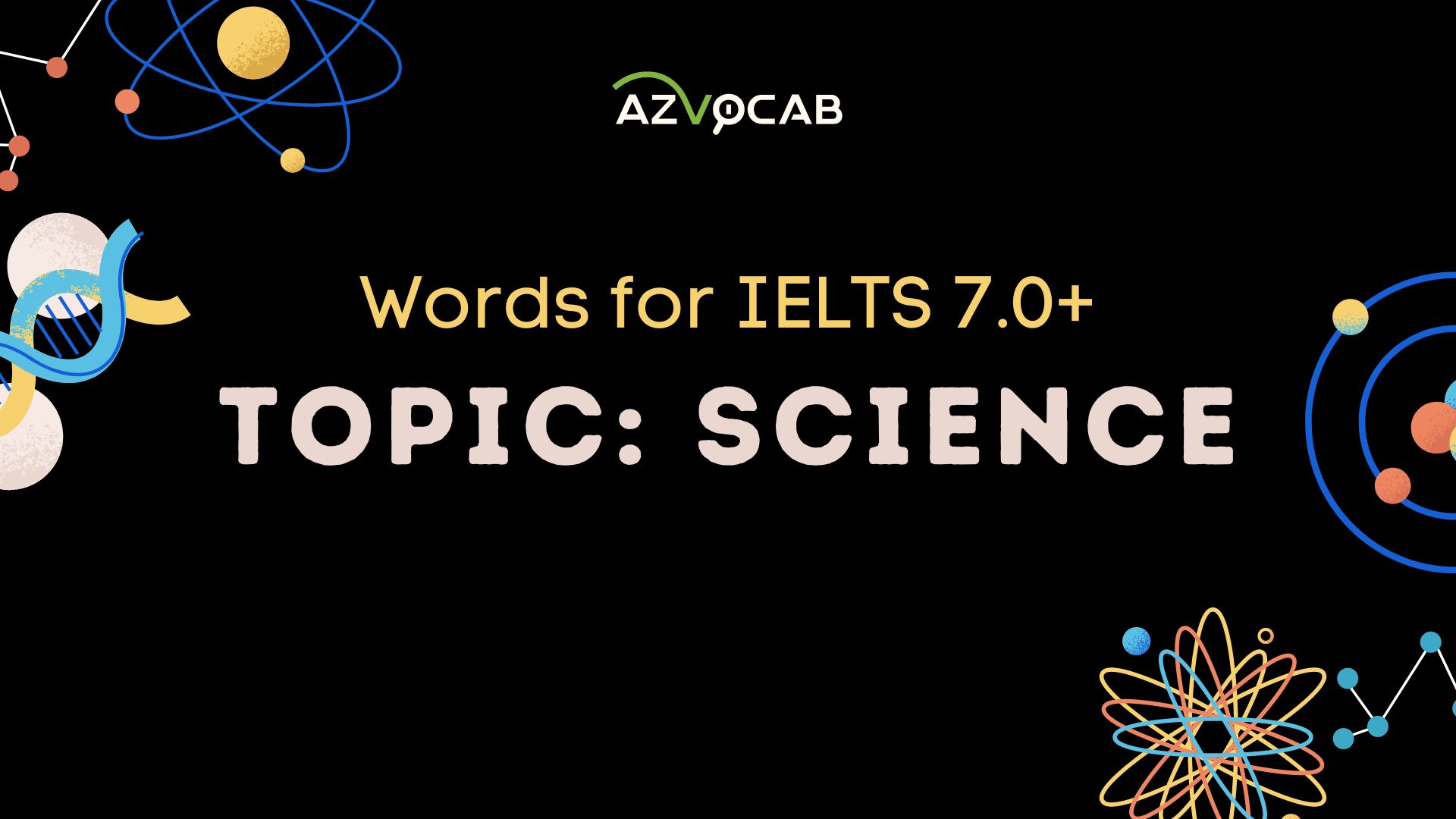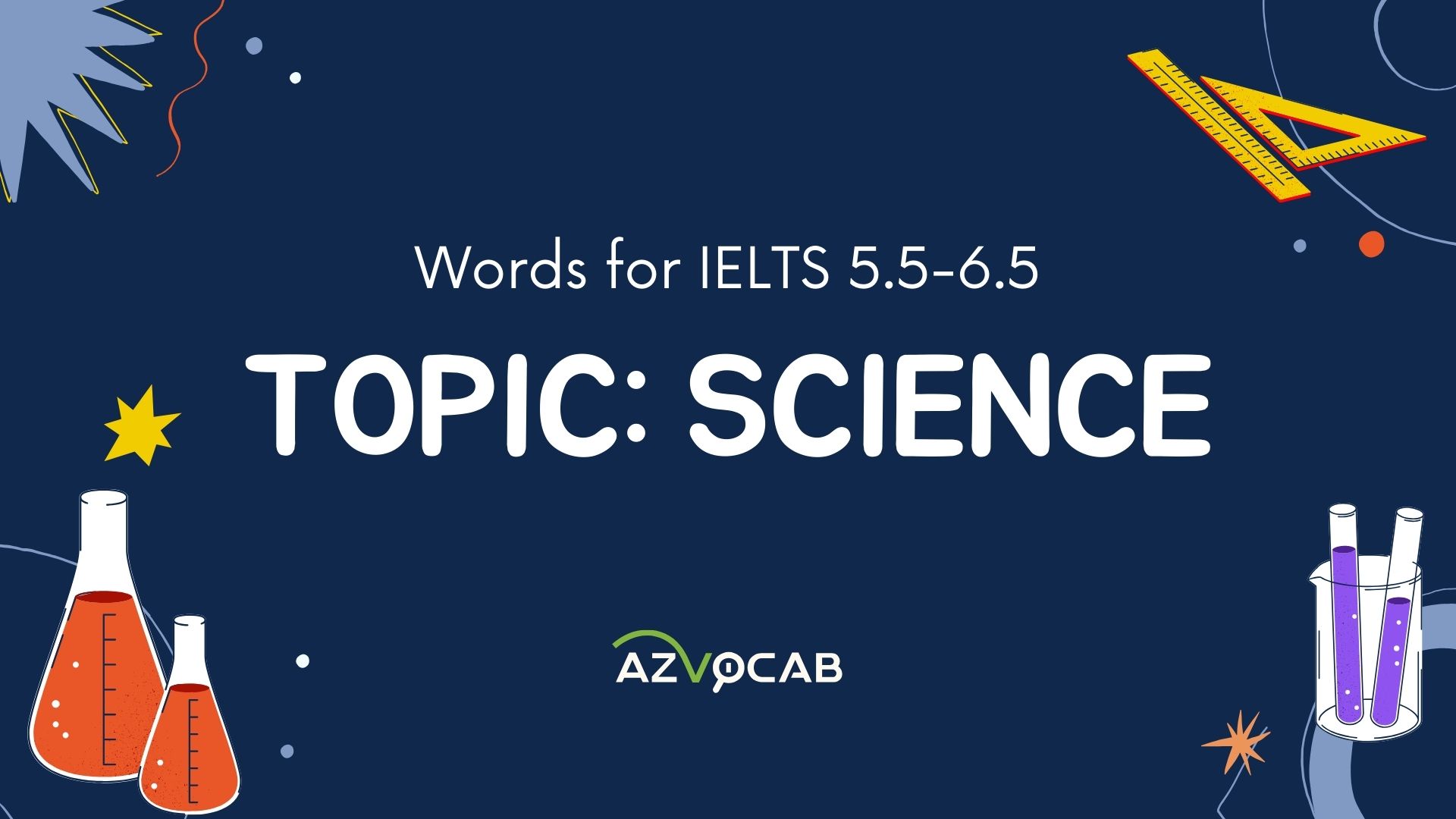50+ Common Words Related to Topic Entertainment and Hobbies for the IELTS Exam
29 August, 2023Common words for IELTS

azVocab has compiled over 50 of the most common words related to the topic of Art for the IELTS exam.
These vocabulary words can be used in four skills: Reading, Listening, Speaking, and Writing. The examples chosen by azVocab are carefully selected in specific contexts in IELTS exams. This will help you understand how to use words in context, increasing the effectiveness of your vocabulary learning.
1. General vocabulary about interests and entertainment
| acquisitiveness (n.) – eagerness to own and collect things | Now, says Twitchell, to curb our acquisitiveness we would have to de-brand: ‘It’s a scarf; it’s not Hermes scarf. It’s a car; it’s not a Lexus. You put it around your neck or you drive it.’ |
| desire (n.) – a strong feeling that you want something | Fuelling the demand are fashion magazines that help create the desire for new must-haves’ for each season. |
| event (n.) – anything that happens, especially something important or unusual | A movie is filmed in a real setting and can use real scenery not only to tell the story but also to convey mood, foreshadow events, and other things. |
| festival (n.) – a special day or period, usually in memory of a religious event, with its own social activities, food, or ceremonies | We mostly hear traditional music on holidays or at special festivals. |
| intimacy (n.) – things that are said or done only by people who have a close relationship with each other | I prefer the intimacy of listening to recorded music and the sound quality is better as well. |
| mood (n.) – the way you feel at a particular time | Music plays a very important role in my life, and I listen to it almost constantly. I find that it helps to set or to change a mood. |
| plank (n.) – a long, narrow, flat piece of wood or similar material, of the type used for making floors | There are three basic types of canoe: the frame-and-bark canoe, the dugout, and the plank canoe. |
| response (n.) – an answer or reaction | Indeed, they argued, it is the creation of strong emotional responses that makes the use of visual images such a powerful tool for memory creation. |
| show business (n.) – the entertainment business, especially the part that is considered to be popular but not very artistic or serious | Stars of the entertainment world turned out to celebrate his 40th year in show business. |
| taste (n.) – a person’s approval of and liking for particular things | A lot of my friends at school listen to all the popular bands and singers, but my tastes are totally different. |
| drab (adj.) – boring, especially in appearance; having little colour and excitement | She walked through the city centre with its drab, grey buildings and felt depressed. |
| emotional (adj.) – having and expressing strong feelings | People generally think that women are more emotional than men, but in my experience that often isn’t the case. |
| hilarious (adj.) – extremely funny and causing a lot of laughter | He didn’t like the film at all – I thought it was hilarious. |
| slick (adj.) – operating or performing skilfully and effectively, without problems and without seeming to need effort | Manilow gave the slick, polished performance that we’ve come to expect. |
| abandon (v.) – to leave a place, thing, or person, usually for ever | I think it’s improbable that everyone will abandon the chemicals we’re using now. |
| discard (v.) – to throw something away or get rid of it because you no longer want or need it | The University of Leeds has now found an energy-efficient way to make hydrogen out of used vegetable oils discarded by restaurants. |
| entertain (v.) – to keep a group of people interested or enjoying themselves | I realise that the media is also there to entertain people, but we need to bear in mind the impact it has on our society. |
| hoard (v.) – to collect large amounts of something and keep it for yourself, often in a secret place | During the siege, people began hoarding food and supplies. |
2. Vocabulary about performing arts, theater, and film
| actor (n.) – someone who pretends to be someone else while performing in a film, play, or television or radio programme | The play was very interesting, and the actors were so talented. |
| actress (n.) – a woman who pretends to be someone else while performing in a film, play, or television programme | She’s the highest-paid actress in Hollywood. |
| animation (n.) – moving images created from drawings, models, etc. that are photographed or created by a computer | There was still no moving image but the pictures created sequences like in animation. |
| audience (n.) – the group of people together in one place to watch or listen to a play, film, someone speaking, etc. | What makes this even more interesting is that some of this year’s performances are going to be interactive so members of the audience will be invited to participate as well. |
| ballerina (n.) – a female ballet dancer | A ballerina fills the movement that she has learned with her particular qualities of feeling, and her dramatic capacities. |
| ballet (n.) – a type of dancing where carefully organized movements tell a story or express an idea, or a theatre work that uses this type of dancing | The “Rock Stars Live!” concert and the Swan Lake ballet were both almost as popular as the “Humorous Situations” mime performance. |
| drama (n.) – a play in a theatre or on television or radio, or plays and acting generally | Miming is still taught in dance, drama, and acting schools worldwide, although it has changed considerably since the ancient Greek plays. |
| performance (n.) – the action of entertaining other people by dancing, singing, acting, or playing music | Right next to the information booth, you’ll be able to enjoy our ‘theatre in the park’ performances. |
| play (n.) – a piece of writing that is intended to be acted in a theatre or on radio or television | Our very talented and professional group Of actors will be performing extracts from classical and modern plays. |
| star quality (n.) – a special ability that makes someone seem very successful or better than other people | He is a player who has the star quality to delight his fans. |
| theatre (n.) – a building, room, or outside structure with rows of seats, each row usually higher than the one in front, from which people can watch a performance or other activity | In the theater, everything takes place on the stage, so I think theater relies a lot more on the acting to convey the sense of place, the mood, things like that. |
| venue (n.) – the place where a public event or meeting happens | Nowadays, a lot of popular groups perform at very large venues in front of audiences of 20,000 or more. |
| live (adj.) – (of a performance) broadcast, recorded, or seen while it is happening | When I was younger I would definitely have said that I preferred live music. |
| outstanding (adj.) – clearly very much better than what is usual | Her outstanding performances set a new benchmark for singers throughout the world. |
| stimulating (adj.) – if something is stimulating, it encourages new ideas | If I’m driving long distances in my car, I prefer to play something stimulating to help keep me awake. |
| cast (v.) – to choose actors to play particular parts in a play, film, or show | The play is being cast in both the US and Britain. |
| choreograph (v.) – to plan the combination of movements to be performed in a dance | Art and design critics will describe how formal qualities like proportion are choreographed to produce the viewer’s rush. |
| perform (v.) – to entertain people by dancing, singing, acting, or playing music | There will be a range of music to suit all tastes from classical to jazz and rock, so please consult your programme to find out when your favourite musicians will be performing on stage. |
3. Vocabulary about literature and music
| echo (n.) – a sound that is heard after it has been reflected off a surface such as a wall or a cliff | The fact that echoes are present in the areas indicates that sound may have been involved. |
| musician (n.) – someone who is skilled in playing music, usually as a job | Today, tattoos are routinely seen on rock musicians, sports stars and other public figures who play a significant role in setting the culture’s behaviour patterns. |
| opera (n.) – a musical play in which most of the words are sung, or plays and music of this type | Opera and classical music do not appear to be very popular forms of entertainment at the National Theater. |
| orchestra (n.) – a large group of musicians who play many different instruments together and are led by a conductor | The second least popular performance was “Works of Beethoven” by the National Symphony Orchestra, with 3,000 tickets sold. |
| fiction (n.) – the type of book or story that is written about imaginary characters and events and not based on real people and facts | Up on the second floor is where the Adult Collection, both fiction and nonfiction. |
| literature (n.) – written artistic works, especially those with a high and lasting artistic value | It was the process by which a work of literature became both institutionalised by the group and learned by its individual members. |
| poetry (n.) – poems in general as a form of literature | Finally, the language only exists in the domain of traditional use, where it might be recited in poetry or song, or used in religious or ritual contexts. |
| writer (n.) – a person who writes books or articles to be published | You’ll be able to listen to a variety of authors reading from their latest works, and it’s wonderful to hear the writers bring their own words to life. |
| rectify (v.) – to correct something or make something right | Every effort is made to rectify any errors before the book is printed. |
4. Vocabulary about fashion
| collection (n.) – a range of new clothes produced by one clothes designer | In the main part of the museum, we have a gallery devoted to works by local artists, our sculpture collection, and a small collection of classical European art. |
| fabric (n.) – cloth or material for making clothes, covering furniture, etc. | The manufacture of polyester and other synthetic fabrics is an energy-intensive process requiring large amounts of crude oil and releasing emissions which can cause or aggravate respiratory disease. |
| fibre (n.) – any of the thread-like parts that form plant or artificial material and can be made into cloth | With the rise in production in the fashion industry, demand for man-made fibres has nearly doubled in the last 15 years. |
| foam (n.) – a soft material used to fill furniture and other objects | I was sitting on a foam rubber mattress a few inches thick, six feet long, and about three and a half feet wide. |
| fabric (n.) – cloth or material for making clothes, covering furniture, etc. | The manufacture of polyester and other synthetic fabrics is an energy-intensive process requiring large amounts of crude oil and releasing emissions which can cause or aggravate respiratory disease. |
| polyester (n.) – an artificial material that is a kind of plastic, often used for making clothes, bags, tents, etc. | For example, polyester, the most widely used manufactured fibre, is made from petroleum. |
| style (n.) – a way of doing something, especially one that is typical of a person, group of people, place, or period | That’s why I prefer classical styles, which aren’t really affected by fashion trends. |
| chic (adj.) – stylish and fashionable | There’s an increasing demand for more chic, higher-quality merchandise. |
| trendy (adj.) – modern and influenced by the most recent fashions or ideas | People are buying those clothes just to be trendy. |
| urge (v.) – to strongly advise or try to persuade someone to do a particular thing | During that war, clothing manufacturers reduced the varieties, sizes and colours of their productions and even urged designers to create styles that would use less fabric and avoid needless decoration. |
Above are common vocabulary words related to the topic of Entertainment and Hobbies for the IELTS exam. In addition to learning vocabulary words, you can also study phrases and idioms to get better grades. To know more about idioms and phrases for IELTS, please take a look at 2 categories: IELTS idioms and IELTS phrases.
ielts
ielts vocabulary
2902
Share





